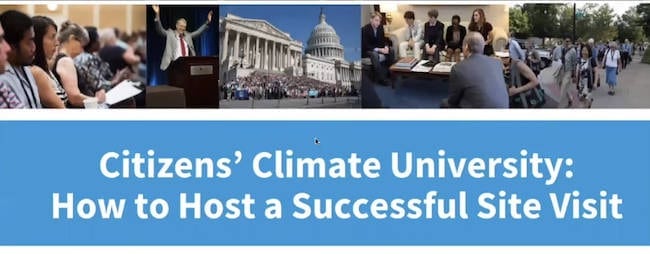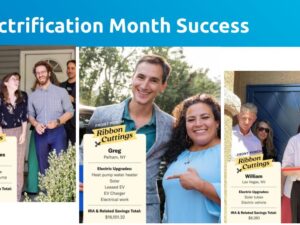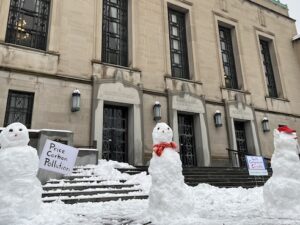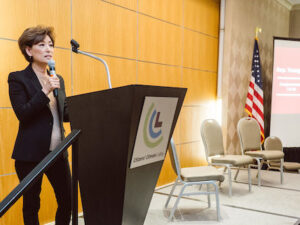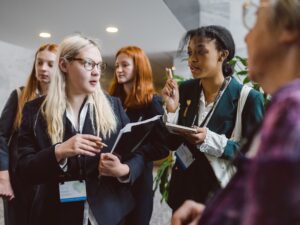Successful site visit stories
By Stephanie Sides
In my last blog, I recapped a Citizens’ Climate University session about deepening initial relationships with members of Congress (MoCs) through providing successful site visits. The goal, of course, is to encourage them to support Carbon Fee and Dividend (CFD) legislation. Here, I share two stories of CCL volunteers in Utah and Michigan who applied and customized this strategy. These were presented on another Citizens’ Climate University session, which you can watch here:
Town hall with Rep. Mia Love (R, UT-04)
When Rep. Love had her first town hall, 10 CCL volunteers from her district attended. They submitted questions, but discussion largely focused on air quality, which is always a pressing issue in Utah.
Following CCL’s November lobby day, Rep. Love made an offer to host a town hall meeting. “Our jaw was on floor,” reacted one volunteer. A similar reaction came from some of Rep. Love’s staffers.
So CCL volunteers and district staffers began working together to organize the event, cooperation essential in developing mutual trust. CCL tried to figure out what Rep. Love’s office wanted the event to be, then tried to make that happen. Announcing such an event has been described as “an invitation to extremists on both sides,” but everyone involved in the planning wanted a productive, issue-oriented discussion to help build support for climate solutions among her constituency. So they sent invitations to CCL volunteers, business leaders, academics, a VP of a local oil company and more.
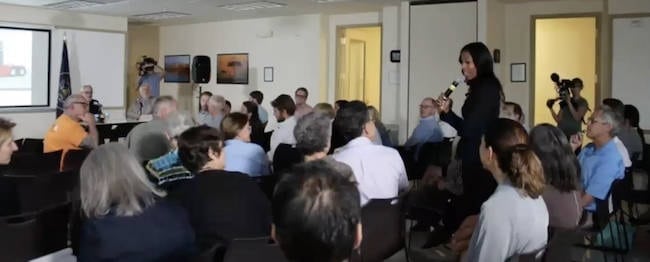
Rep. Mia Love served as the moderator for the event.
Jay Butera who had worked with Rep. Love’s DC staff suggested that “The Years of Living Dangerously” might want to film the event, which Love agreed to. At the event, Love served as the moderator with four panelists: a member of the governor’s Office of Energy Development, a climate scientist from a local university, Jerry Taylor from the Niskanen Center, and the CEO of an electric vehicle company in Utah. Their opinions varied widely, but opening up the conversation was valuable. After the town hall, CCL volunteers supported Love to produce a 4-minute video of the town hall meeting to continue raising awareness of climate change.
Thereafter, Rep. Love wrote an op-ed in the Salt Lake Tribune, suggesting that it’s possible to find climate solutions and have a thriving economy. In conservative Utah, it made a resounding statement.
Three pieces of state legislation were introduced in January this year, one of which has already passed. It’s clear that the climate conversation is no longer politically untenable for Republicans, and that’s a remarkable step forward.
Student presentation for Rep. Jack Bergman (R, MI-01)
Last summer, the Traverse City group took high school students to the June CCL conference and lobby day, which resulted in Rep. Bergman committing to join the Climate Solutions Caucus. At that point, Bergman was engaged and wanted to know what else he could do. His idea: I will come to your school so you can pitch CFD to me as a business proposal.
The chapter met twice a week, conducting research and preparing their presentation. Then they held practice sessions with community leaders to provide feedback. One included members of the business community, the other legislative leaders. (Rep. Bergman is a businessman turned politician, so the students needed to reflect on both perspectives.) These sessions also provided the additional opportunity to educate community leaders on CFD and work to get them on board.
What the students found was that the panelists were less invested in them than their parents and teachers, and, as a result, provided the critical feedback they needed. The legislative panel in particular focused more on student delivery. “Appeal to your audience,” they suggested. “Connect on a local level.” As a result, the students reorganized the entire presentation.
The result was a site visit with Rep. Bergman that “could not have gone better.” The students demonstrated their passion for the topic and largely conquered their nerves. Perhaps because they were so well prepared, the MoC had very few questions about the CFD policy. Plus, the students had fun. Their empowerment was recorded in a documentary of the visit made by the Traverse City public school system, which they could then share with other CCL chapters.
The students followed up by asking the MoC to return to the district to tour local businesses impacted by climate change. They gathered farmers, owners of a ski resort and winery, and members of the local Chamber of Commerce. The MoC listened for a full hour, then agreed to come back to tour the ski resort. Now, the office’s legislative aid is even talking about attending the local CCL meeting.
For more on all of these site visits, visit the Citizens’ Climate University page on this session.
Every week, Citizens’ Climate University hosts a live, online learning session to educate and empower climate action volunteers. Browse past lessons in CCL Community, and mark your calendar for upcoming sessions.

